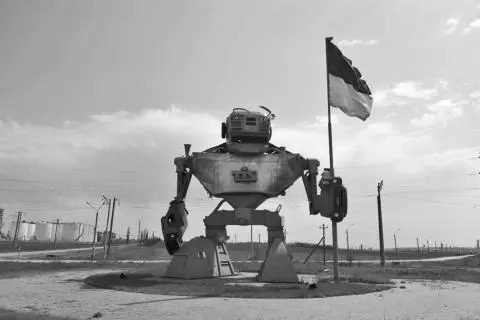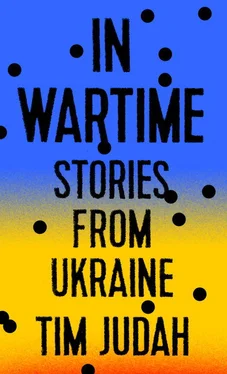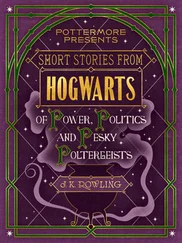Andrey is burly and wears a sky-blue, long-sleeved T-shirt. The history of the port is “very simple,” he said. Oleksiy, his Jewish father, was born in 1943, the son of a well-known mining engineer whose job at the time was to sabotage mines before the Nazis reached them, so during the invasion of the Soviet Union, he was always working one step ahead of them. Oleksiy could not have chosen a more different career. He became a mountaineer and was head of the mountain rescue service in the Caucasus until 1988, when he returned home to Odessa. The period that was beginning was one of huge opportunities for those who knew how to grab them, and Oleksiy did. In 1989 he started opening shops selling imported goods. They were a success. In 1994 he came to this spot with Oleg Kutateladze, his lawyer and friend, to inspect a derelict port site. Just before the end of the Soviet Union the authorities had begun building a terminal here, primarily to unload phosphates from Morocco. The project ran afoul of the new ecology movement which, as everywhere else in the Soviet Union, preceded the emergence of political parties. One ship came to dock but, confronted with protesters, never unloaded, and sailed away. The port was mothballed and the project left as an unfinished building site.
Oleksiy and Oleg thought this would be a good place to load fertilizers for export. First they rented the land, went on to form a joint venture with the authorities and finally bought the place in 2001. The port began work in 1996, and in 1997 it handled its first million metric tons. In 2014 it handled 26 million metric tons and 720 ships. In 1998 they began building a grain terminal. During the Soviet period, most of Ukraine’s grain went to the rest of the country. With independence, producers began to export outside of the former Soviet Union. Oleksiy was a driven man and a workaholic. He built a house next to the port so that he could live right next door to what he loved most in the world. He took to the challenge of building a business as if climbing the hardest of mountains. He micromanaged everything, Andrey told me, and he delegated no decisions, whether they were about “$50 or $50 million.”
Born in 1982, Andrey was only a child when the Soviet Union collapsed, but he was a teenager in the chaotic mid-1990s as his father was building a multimillion-dollar business. The relationship between father and son was tense, and besides, in this violent period, the threat of kidnapping was real. At the age of fifteen Andrey was dispatched to a boarding school in England. He hated the weather, and the food and the school were not much good. The following year he was sent to an American school in Switzerland, not least because his father was worried about drugs in England. When Andrey arrived, one of the first people he met was a Russian boy who said, “Shall we go and get some weed downtown?” After this he was sent to a French business school in Moscow to do an MBA. This was another error, he said: “Don’t ever do an MBA before you have five or six years’ experience.” Andrey belonged to the first generation of children of wealthy Ukrainians and Russians to be sent abroad, and they learned by their mistakes.
Even though he was also studying in Moscow, Andrey began working with his father. One of the most difficult things was that he wanted to see results straightaway, but in the port business it can be five years between an idea becoming a plan and turning into a working reality. “I had lots of conflicts with my father, it was very difficult to get along and I quit twice.” Then, when he was twenty-five, his father got cancer. At that point, he says, “all of my pride disappeared. Everything became very simple after that.” His father divided the shares of the business between Andrey and his older brother, who now looks after the finances, and started preparing them to take over the company. Just before Oleksiy died in 2011, Andrey was made CEO. “No matter how hard you prove yourself,” he told me, “you will always be the son of the founder… no matter what. It was very difficult, and everyone was twenty years older than me.” Had he enjoyed it? “It was fun…” In front of the TIS office building there is a statue of Oleksiy.
If the company had withered after Oleksiy died, the skeptics would have gloated that the former fun-loving party boy was not worthy of his father. But, in the last five years, turnover has tripled as has income. Despite the turmoil of 2014, the venture still prospered. Some Russian business was lost but new partners were found, and anyway, said Andrey, much of what they do is a function of global demand for commodities. As long as Ukraine is still producing grain and iron ore and everything else the world needs, all of it will still need to be exported. His colleagues who have really suffered, he said, are those dealing in imports, especially of consumer goods. The decline of the hryvnia has slashed everyone’s purchasing power. The next two or three years could see setbacks even for him though. Credit is virtually impossible to get for most businesses, and this will affect production, especially in the agricultural sector. If that means less is produced, it means less to export too.
In these turbulent times Andrey has made no secret of which side of the barricades he is on. At the entrance to the TIS port is a giant Transformers-style robot sculpture holding a Ukrainian flag. For its mouth it has a red digital ticker-tape screen along which run the words Slava Ukraini! “Glory to Ukraine!” More than a year after the beginning of the war in the east, Andrey was fairly confident that the critical point of risk had passed and that Odessa was not about to fall into separatist or Russian hands. Anyone watching television can see what is happening in Donetsk and Lugansk, he said, and so can make their own realistic assumption about what would happen here if conflict were to spread. When there had been anti-Ukrainian demonstrations in the city in 2014, he had mingled with protesters to hear what they were saying and was shocked that middle-class people were among them. “There were doctors and teachers and government officials, and their salaries are way bigger in Russia. They were just fed up with low salaries and low pensions.” At the time many thought that Odessa might fall into Russian hands like Crimea, but one key difference is that perhaps most people in Crimea wanted to become part of Russia when the opportunity arose, while the same could not be said about Odessa.

Robot at the entrance to the TIS terminal. Vizirka, April 2015.
Andrey said it was hard to know what his workers thought, not least because he had decreed that politics must be left at the port gate. He estimated, “We had people in favor of Russia, perhaps thirty percent and maybe they still are, and then seventy percent for Ukraine.” The difference would be if 10 percent of the pro-Russians were actively propagating their views. When the war began and a port train driver stuck a Donetsk People’s Republic flag on his locomotive, Andrey says he was fired within two hours. More sinister was the day his security men found a man dressed like a homeless person snooping about. When they searched him they found he had a Russian military officer’s identity document on him. He was handed over to the Ukrainian security services. He must have been a low-level operative and a dimwit at that for carrying ID, but it was clear what he was doing. “This is where military ships could berth.” If Russia was going to land men and military equipment in a bid to take Odessa, the TIS port would be the ideal place to do it.
Especially at the most critical times, Andrey was active in the local media. He wanted people to see that he was taking a pro-Ukrainian position at a time when many were uncertain and no one knew if, in the wake of the loss of Crimea and the beginning of the war, the rest of Ukraine might simply implode. He wanted everyone to know that “we would be in big trouble if Russia came.” Then those close to him and colleagues in Odessa suggested he pipe down, even though they shared his views. They feared that if Ukraine lost Odessa, anyone who had been prominent in support of it would lose their business and believed that whatever happened, they had a responsibility to their workers and families and perhaps it was not worth risking all if it meant that the business would be destroyed. Andrey did not pipe down.
Читать дальше













